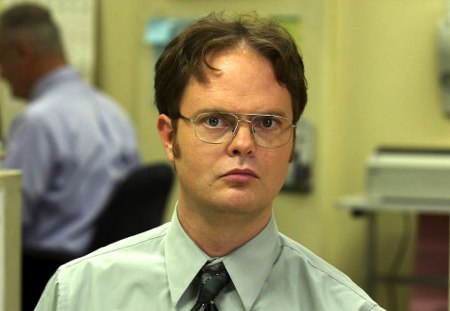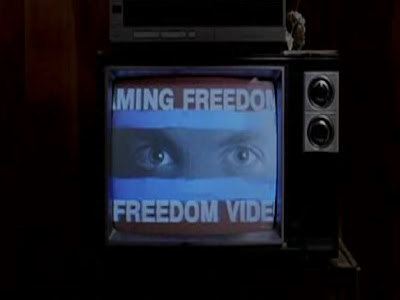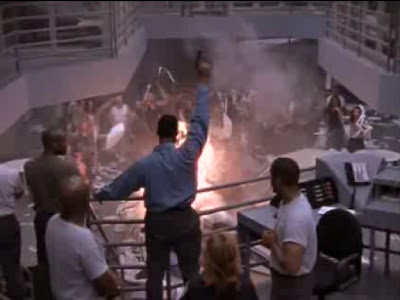As I was browsing the infinitely interesting documentary section of Hulu.com, I came across "Darkon," a cinematic gem about a community of live-action role-players living in a claustrophobic Baltimore suburb. I was captivated, to say the least.
Basically, people who play Darkon create a character who "lives" in the imaginary land of Darkon. Their character joins or creates a kingdom by buying imaginary hexons of "land" using "money" that they somehow "earn" by dressing up in homemade costumes and hitting each other with foam swords every other Sunday. This in-game currency is not to be confused with actual money, which all Darkon players seem to be distinctly lacking; this is actually what makes them, bear with me on this one, extremely endearing.
First, we have the affably tragic Darkon-ites. There's the film's primary subject, whose real name escapes me but who is known in-game as Bannor of Laconia. He's a stay-at-home dad, bitterly excluded from his family's playing card business, and whose friends claim, without ANY embarrassment or irony, that their frat-boy glory days were spent playing Dungeons and Dragons.
There's the teenager who looks and fights exactly like the Youtube Star Wars kid. He uses Darkon as a weight loss program and a social network that will one day bring him the courage he needs to talk to a girl.
There's the Iraq War veteran who states that, after seeing an eight-year-old girl with a bomb strapped to her, he is searching for some meaning in life.
There are also several wonderfully simple young men in the film, the types that you imagine just like beating the crap out of each other with foam swords on the weekends.
And then there's Kenyon Wells, aka Keldar of the Mordomian Empire. I cannot even begin to describe exactly how much, in word, deed, and appearance, Mr. Wells resembles Dwight Schrute from "The Office."

 Spooky, huh?
Spooky, huh?Kenyon even claims that before Darkon, he was bad at dealing with people, but by playing Keldar, he has risen to a management position in his workplace.
Anyhow, "Keldar" here is pretty much a Darkon bully who generates all the action in the movie. He's the leader of Mordom, an extremely populous, land-hogging, and evil kingdom that is quickly defeating all the other kingdoms and taking over Darkon. We can only assume that he is also the author of the ridiculously infectious Mordom rallying cry: "HAIL MORDOM! Hail Mordom! HAIL MORDOM! Hail Mordom!" You can imagine my surprise when that got stuck in my head.
Bannor of Laconia, the pudgy, lovable stay-at-home dad we mentioned earlier, is worried by how powerful Keldar is becoming and wants to unite the other kingdoms to take him down. He mentions something about Mordom committing war crimes, but basically he wants to be the big man on campus, so he's going after the reigning champion.
Here's Bannor gearing up to kick some foam:

It may seem silly to dwell so long on people's in-game characters and story lines, but if you hold that sentiment, you fail to realize just how deep this game actually goes. I can get more correct image search hits for these people by using their in-game names than their real ones, and Mordom, it turns out, has an official logo.
It's weird, it's really weird, but you'll be surprised at how much you wind up liking these guys. They have very distinct personal philosophies and reasons for playing. Bannor sees his quest to defeat the Mordomian Empire as the quintessential American struggle against tyranny and oppression. One of the other rebels, later on, remarks that he feels that Mordom is like the United States, while Laconia and the other kingdoms are like "the terrorists," a comment that draws a truly hilarious sneer from the woman sitting next to him.
But the truly amazing thing about "Darkon," the thing that sneaks up and slaps you across the face, is how down to earth these people actually are. The clarity with which they view themselves approaches self-deprecation at times. In one-on-one interviews, they admit that their lives seem pointless, without direction, without control, and that they use the game to escape those feelings. They are reclaiming their right to matter in a world that doesn't need them to be anything more than drones. From the lathe operator to the fabric buyer, they all feel lost and forgotten in the maze of housing developments and freeways, sweeping vistas of which take on a breathless beauty in the hands of our filmmakers. There is a truly touching moment when "Bannor," going about his mundane husbandly duties, pauses while taking out his trash to look up at a jet plane. The haunting violin score contributes to these themes of alienation and disillusionment.
I recently read an editorial in the New York Times about how to manage feeling out of control in the current economic climate. The writer referred to his grandmother, a Holocaust survivor. For a short period during her time in a concentration camp, she fed a stray cat with her own food. According to psychologists, the writer claims, many Holocaust survivors made it day to day by creating an illusion of control in their lives, be it completely internal or more external, like feeding a cat.
As I watched "Darkon," I couldn't help but think back to this article. LARP sure looks insane, but perhaps it's just another mechanism humans use to simulate control; maybe these mechanisms are the only things that keep any of us sane anymore. So maybe LARP isn't your thing, but maybe you go to movies, maybe you drive fast cars, maybe you have a misleading Myspace page, or maybe you drink all the time.
All that being said, LARP in action looks hilarious and this movie is a ball to watch. Despite how deep its waters run, you'll be laughing for most of "Darkon." In one scene, players attack what appears to be a giant, deranged Sour Patch Kid made of foam, without any explanation whatsoever. In another, a small child engages in a very long epic battle sequence all by himself. The climactic Darkon battle occurs at the Citadel of Peace, which the players must build themselves. You can imagine the scale of the results.
As funny as it is, "Darkon" never feels unfair, exploitative, or voyeuristic. Though it's weird, the people come across very well. Save for a few exceptions, they are incredibly cooperative and respectful of one another. Remember when you were little, and you used to play pretend, and you'd "kill" somebody, but they'd just keep saying "You missed me!" and wouldn't stay down?
Yeah, those kids don't play Darkon.
All in all, "Darkon" is a well-made and engaging documentary about a fascinating, if cringe-inducing subculture. It winds up delving deep into the ways Americans construct selfhood and deal with failure and alienation.
And remember. Never trust an elf.
It's weird, it's really weird, but you'll be surprised at how much you wind up liking these guys. They have very distinct personal philosophies and reasons for playing. Bannor sees his quest to defeat the Mordomian Empire as the quintessential American struggle against tyranny and oppression. One of the other rebels, later on, remarks that he feels that Mordom is like the United States, while Laconia and the other kingdoms are like "the terrorists," a comment that draws a truly hilarious sneer from the woman sitting next to him.
But the truly amazing thing about "Darkon," the thing that sneaks up and slaps you across the face, is how down to earth these people actually are. The clarity with which they view themselves approaches self-deprecation at times. In one-on-one interviews, they admit that their lives seem pointless, without direction, without control, and that they use the game to escape those feelings. They are reclaiming their right to matter in a world that doesn't need them to be anything more than drones. From the lathe operator to the fabric buyer, they all feel lost and forgotten in the maze of housing developments and freeways, sweeping vistas of which take on a breathless beauty in the hands of our filmmakers. There is a truly touching moment when "Bannor," going about his mundane husbandly duties, pauses while taking out his trash to look up at a jet plane. The haunting violin score contributes to these themes of alienation and disillusionment.
I recently read an editorial in the New York Times about how to manage feeling out of control in the current economic climate. The writer referred to his grandmother, a Holocaust survivor. For a short period during her time in a concentration camp, she fed a stray cat with her own food. According to psychologists, the writer claims, many Holocaust survivors made it day to day by creating an illusion of control in their lives, be it completely internal or more external, like feeding a cat.
As I watched "Darkon," I couldn't help but think back to this article. LARP sure looks insane, but perhaps it's just another mechanism humans use to simulate control; maybe these mechanisms are the only things that keep any of us sane anymore. So maybe LARP isn't your thing, but maybe you go to movies, maybe you drive fast cars, maybe you have a misleading Myspace page, or maybe you drink all the time.
All that being said, LARP in action looks hilarious and this movie is a ball to watch. Despite how deep its waters run, you'll be laughing for most of "Darkon." In one scene, players attack what appears to be a giant, deranged Sour Patch Kid made of foam, without any explanation whatsoever. In another, a small child engages in a very long epic battle sequence all by himself. The climactic Darkon battle occurs at the Citadel of Peace, which the players must build themselves. You can imagine the scale of the results.
As funny as it is, "Darkon" never feels unfair, exploitative, or voyeuristic. Though it's weird, the people come across very well. Save for a few exceptions, they are incredibly cooperative and respectful of one another. Remember when you were little, and you used to play pretend, and you'd "kill" somebody, but they'd just keep saying "You missed me!" and wouldn't stay down?
Yeah, those kids don't play Darkon.
All in all, "Darkon" is a well-made and engaging documentary about a fascinating, if cringe-inducing subculture. It winds up delving deep into the ways Americans construct selfhood and deal with failure and alienation.
And remember. Never trust an elf.


 Huh.
Huh. You, too, can look like this for $19.99!!
You, too, can look like this for $19.99!!





































 Although the Muslims don't start the riot, though they sure as hell end it. The riot starts for real when these two random guys get in a fight over a game of checkers, and it just devolves from there.
Although the Muslims don't start the riot, though they sure as hell end it. The riot starts for real when these two random guys get in a fight over a game of checkers, and it just devolves from there.













